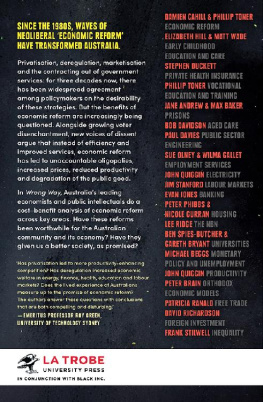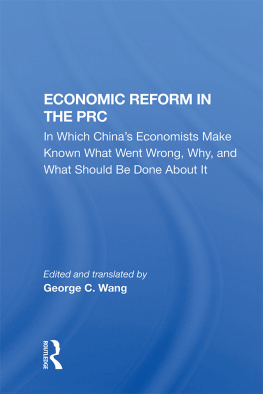Published by La Trobe University Press in conjunction with Black Inc.
Level 1, 221 Drummond Street
Carlton VIC 3053, Australia
www.blackincbooks.com
www.latrobeuniversitypress.com.au
La Trobe University plays an integral role in Australias public intellectual life, and is recognised globally for its research excellence and commitment to ideas and debate.
La Trobe University Press publishes books of high intellectual quality, aimed at general readers. Titles range across the humanities and sciences, and are written by distinguished and innovative scholars. La Trobe University Press books are produced in conjunction with Black Inc., an independent Australian publishing house. The members of the LTUP Editorial Board are Vice-Chancellors Fellows Emeritus Professor Robert Manne and Dr Elizabeth Finkel, and Morry Schwartz and Chris Feik of Black Inc.
Introduction and selection Damien Cahill and Phillip Toner 2018 Individual essays retained by the authors, who assert their rights to be known as the author of their work.
ALL RIGHTS RESERVED.
No part of this publication may be reproduced, stored in a retrieval system, or transmitted in any form by any means electronic, mechanical, photocopying, recording or otherwise without the prior consent of the publishers.
9781760640385 (paperback)
9781743820605 (ebook)

Cover design by Kim Ferguson
Text design and typesetting by Tristan Main
Maps by Alan Laver
INTRODUCTION:
SITUATING PRIVATISATION
AND ECONOMIC REFORM
DAMIEN CAHILL AND PHILLIP TONER
Why This Book and Why Now?
Since the early 1980s, Australia and its economy have been radically transformed by the processes of privatisation, deregulation and marketisation; free trade agreements; and new approaches to macro-economic policy focused on balancing budgets, reducing rates of income and corporate tax, constraining organised labour and targeting inflation. Markets have become the preferred means of delivering public amenities, and a general aversion to direct government service provision sits alongside rhetorical fidelity to slimming the state. Going by the euphemistic terms economic reform and microeconomic reform to its adherents and, variously, economic rationalism, neoliberalism or market fundamentalism to its detractors the commitment to such processes has come to form a political consensus across the major political parties, the senior ranks of the public service and the news media, especially the financial press.
More than sufficient time has elapsed since the general adoption of economic reform in Australia to make a mature assessment of actual policy outcomes against policy intentions. It is no longer credible to explain away the deleterious consequences of this process as transitional problems or as the result of imperfect implementation. Through a series of detailed case studies commissioned from leading Australian experts, Wrong Way critically analyses the effects of privatisation, contracting out and economic reform. Its key findings are that not only have processes of reform failed to deliver many of the benefits promised by their advocates, they have also imposed a raft of economic and social costs on the Australian community.
While voices of dissent have been present throughout the long history of this project, more recently the wisdom of a dogmatic attachment to economic reform has been questioned even among some of its hitherto strongest supporters. When Rod Sims, head of the Australian Competition and Consumer Commission (ACCC) and historically a staunch advocate of economic reform, argued in 2016 that privatisation had increased prices, stifled productivity and created the conditions for unaccountable oligopolies, it was clear that a shift in the climate of opinion was afoot (Hatch 2016). Similarly, former head of the Business Council of Australia (BCA) Tony Shepherd who, as chair of the Abbott governments National Commission of Audit, has been a strong advocate for smaller government, recently lamented the loss of expertise and policy formulation competence in government due to job losses and an excessive reliance on external consultants (Donaldson 2018).
Internationally, the Organisation for Economic Co-operation and Development (OECD) has been warning of the negative effects of stark income inequality on economic growth since 2008. Its 2015 report, In It Together: Why Less Inequality Benefits All, argues that inequality produced by neoliberal policies has dampened growth. The OECD has also revised its long-standing endorsement of labour market deregulation and is highlighting the adverse effects on labour markets of the surge in precarious employment. In a policy about-face, it now advocates collective bargaining, provided it is quite centralised or co-ordinated, which it argues has positive effects on labour market resilience (OECD 2017: 9). Similarly, the International Monetary Fund (IMF) responsible for the imposition of neoliberal structural adjustment programs across the Global South has revised its support for fiscal austerity and for the removal of controls on international capital flows (Ostry, Loungani and Furceri 2016).
The broader context underpinning this change of mind is the radically transformed economic environment since the 2008 global financial crisis. Anaemic growth, deflation, high unemployment, austerity, rising economic insecurity and increasing levels of wealth and income inequality have generated widespread disenchantment with mainstream politics, the neoliberal consensus, globalisation and even democracy itself. Many of the unexpected political turns of the last few years the surge in support for Bernie Sanders and the election of Donald Trump in the United States; Jeremy Corbyn and the Brexit vote in the United Kingdom; the rise of nationalist parties in Western and Eastern Europe are only comprehensible within this context. Neoliberalism might still be the dominant ideology, but it is nonetheless being challenged from the left, the right and the centre.
Most of the nineteen chapters in this book offer an empirical case study of the effects of economic reform within a specific industry. These include electricity (Quiggin); child care (Hill and Wade); aged care (Davidson); employment services (Olney and Gallet); the National Broadband Network (Ridge); prisons (Andrew and Baker); residential housing (Phibbs and Gurran); banking (Jones); private health insurance (Duckett); the Higher Education Contribution Scheme (Spies-Butcher and Bryant); and vocational education and training (Toner). Also included are chapters covering broad transformational policies that affect all industries, including free trade agreements (Ranald); liberalised foreign investment policy (Richardson); labour market deregulation (Stanford); and monetary policy (Beggs). Other chapters reflect on both the causes and consequences of these policies, including the loss of expertise within the public sector (Davies); the growth of income and wealth inequality under economic reform (Stilwell); the central role of computerised general equilibrium modelling in justifying economic reform, how its assumptions are contradicted by the facts of modern economies and why these assumptions exaggerate the benefits and minimise the cost of reform (Brain); and, finally why the concept of productivity has been central to justifications of economic reform in the neoliberal era despite the flaws in its measurement and its disappointing record (Quiggin).










